
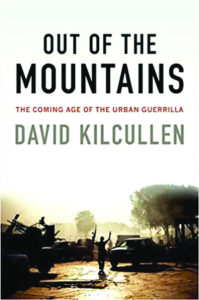
Out of the Mountains: The Coming Age of the Urban Guerrilla
David Kilcullen
Hurst Publishers (2015)
Rs2,078
When Americans think of modern warfare, what comes to mind is the US army skirmishing with terrorists and insurgents in the mountains of Afghanistan. But the face of global conflict is ever-changing. In Out of the Mountains, David Kilcullen, one of the world’s leading experts on current and future conflict, offers a groundbreaking look at what may happen after today’s wars end. This is a book about future conflicts and future cities, and about the challenges and opportunities that four powerful megatrends—population, urbanization, coastal settlement, and connectedness—are creating across the planet. And it is about what cities, communities and businesses can do to prepare for a future in which all aspects of human society—including, but not limited to, conflict, crime and violence—are changing at an unprecedented pace.
Kilcullen argues that conflict is increasingly likely to occur in sprawling coastal cities, in peri-urban slum settlements that are enveloping many regions of the Middle East, Africa, Latin America and Asia, and in highly connected, electronically networked settings. He suggests that cities, rather than countries, are the critical unit of analysis for future conflict and that resiliency, not stability, will be the key objective. Ranging across the globe—from Kingston to Mogadishu to Lagos to Benghazi to Mumbai—he offers a unified theory of “competitive control” that explains how non-state armed groups such as drug cartels, street gangs, and warlords draw their strength from local populations, providing useful ideas for dealing with these groups and with diffuse social conflicts in general. His extensive fieldwork on the ground in a series of urban conflicts suggests that there will be no military solution for many of the struggles we will face in the future. We will need to involve local people deeply to address problems that neither outsiders nor locals alone can solve, drawing on the insight only locals can bring, together with outsider knowledge from fields like urban planning, systems engineering, renewable energy, conflict resolution and mediation.
This deeply researched and compellingly argued book provides an invaluable roadmap to a future that will increasingly be crowded, urban, coastal, connected—and dangerous.
David Kilcullen is the author of the highly acclaimed The Accidental Guerrilla and Counterinsurgency. A former soldier and diplomat, he served as a senior advisor to both General David H. Petraeus and Secretary of State Condoleezza Rice during the wars in Iraq and Afghanistan. In recent years he has focused on fieldwork to support aid agencies, non-government organizations and local communities in conflict and disaster-affected regions, and on developing new ways to think about complex conflicts in highly networked urban environments.
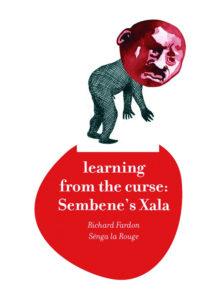
Learning from the Curse: Sembene’s Xala
Richard Fardon and Senga la Rouge
Hurst Publishers (2017)
Rs3,742
This book is about a story (Ousmane Sembene’s Xala), about a time (the aftermath of Senegalese Independence), and about a place (Dakar, the capital of Senegal). It’s also about the collaboration between an artist and an anthropologist, who have reacted in their different mediums to the story, time and place, and to what the other made of them.
So opens a unique account in a genre of its own devising that will engage readers interested in Sembene Ousmane as writer and film director, in Senegal, in African film, in West Africa, or in books designed to be desirable objects in their own right.
Richard Fardon is a social anthropologist who has researched and written about West Africa. He teaches at SOAS, University of London.
Sènga la Rouge is a Paris-based artist. Her wide interests include carnets de voyage, drawing performances, and drawing in and as performance.
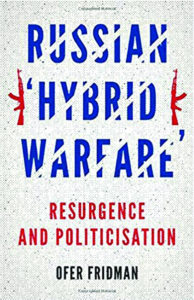
Russian “Hybrid Warfare”: Resurgence and Politicization
Ofer Fridman
Hurst Publishers (2018)
Rs6,240
During the last decade, ‘Hybrid Warfare’ has become a novel yet controversial term in academic, political and professional military lexicons, intended to suggest some sort of mix between different military and non-military means and methods of confrontation. Enthusiastic discussion of the notion has been undermined by conceptual vagueness and political manipulation, particularly since the onset of the Ukrainian Crisis in early 2014, as ideas about Hybrid Warfare engulf Russia and the West, especially in the media.
Western defense and political specialists analyzing Russian responses to the crisis have been quick to confirm that Hybrid Warfare is the Kremlin’s main strategy in the twenty-first century. But many respected Russian strategists and political observers contend that it is the West that has been waging Hybrid War, Gibridnaya Voyna, since the end of the Cold War.
In this highly topical book, Ofer Fridman offers a clear delineation of the conceptual debates about Hybrid Warfare. What leads Russian experts to say that the West is conducting a Gibridnaya Voyna against Russia, and what do they mean by it? Why do Western observers claim that the Kremlin engages in Hybrid Warfare? And, beyond terminology, is this something genuinely new?
Ofer Fridman is Director of Operations at the King’s Centre for Strategic Communications (KCSC) and a research fellow at the Department of War Studies, King’s College London.
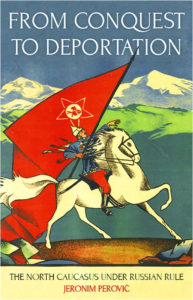
From Conquest to Deportation: The North Caucasus under Russian Rule
Jeronim Perovic
Hurst Publishers (2018)
Rs13,520
This book is about a region on the fringes of empire, which neither Tsarist Russia, nor the Soviet Union, nor in fact the Russian Federation, ever really managed to control. Starting with the nineteenth century, it analyses the state’s various strategies to establish its rule over populations highly resilient to change imposed from outside, who frequently resorted to arms to resist interference in their religious practices and beliefs, traditional customs, and ways of life.
Jeronim Perovic offers a major contribution to our knowledge of the early Soviet era, a crucial yet overlooked period in this region’s troubled history. During the 1920s and 1930s, the various peoples of this predominantly Muslim region came into contact for the first time with a modernising state, demanding not only unconditional loyalty but active participation in the project of ‘socialist transformation’. Drawing on unpublished documents from Russian archives, Perovi? investigates the changes wrought by Russian policy and explains why, from Moscow’s perspective, these modernization attempts failed, ultimately prompting the Stalinist leadership to forcefully exile the Chechens and other North Caucasians to Central Asia in 1943-4.
Jeronim Perovic is Professor of Eastern European History at the University of Zurich, Switzerland. He specialises in the history of Russia and the Soviet Union, as well as the history of the Balkans. He has previously held scholarships at the Woodrow Wilson International Center for Scholars, the Davis Center for Russian and Eurasian Studies at Harvard University, and the Center for Russian, East European and Eurasian Studies at Stanford University.
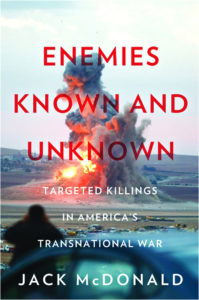
Enemies Known and Unknown: Targeted Killings in America’s Transnational War
Jack McDonald
Hurst Publishers (2017)
Rs3,742
President Obama was elected on an anti-war platform, yet targeted killings have increased under his command of the ‘War on Terror’. The US thinks of itself as upholding the rule of international law and spreading democracy, yet such targeted killings have been widely decried as extra-judicial violations of human rights. This book examines these paradoxes, arguing that they are partially explained by the application of existing legal standards to transnational wars.
Critics argue that the kind of war the US claims to be waging — transnational armed conflict — doesn’t actually exist. McDonald analyses the concept of transnational war and the legal interpretations that underpin it, and argues that the Obama administration’s adherence to the rule of law produces a status quo of violence that is in some ways more disturbing than the excesses of the Bush administration.
America’s interpretations of sovereignty and international law shape and constitute war itself, with lethal consequences for the named and anonymous persons that it unilaterally defines as participants. McDonald’s analysis helps us understand the social and legal construction of legitimate violence in warfare, and the relationship between legal opinions formed in US government departments and acts of violence half a world away.
Reviews
‘Lucid, informed and authoritative — one of those rare books which will be required reading for years to come. One learns as much about the nature of war itself and our relationship with it as about the specific issue of targeted killings.’ — Christopher Coker, Professor of International Relations, London School of Economics, author of Rebooting Clausewitz: ‘On War’ in the Twenty-First Century
‘President Trump is set to continue the Obama and Bush policies of targeted killings. Whether you think they should be condemned as counter-productive illegal assassination or commended as the most effective way found to date to rid the world of ruthless terrorists, you will find arguments to challenge you in Jack McDonald’s book. He lays painfully bare the contested relationship between war, technology, violence and law and the origins of the present controversy over transnational war waged at the individual level.’ — Sir David Omand GCB, former director of GCHQ and author of Securing the State
‘There has been a plethora of books on drones and their activities; none of them has yet effectively hit, so to speak, the issue of targeted killings and the law. This book does that. For students of current conflict, international law or air power, this must be the set book on targeted killings, especially by drones, and the law that supposedly encompasses their use.’ — Frank Ledwidge, author of Rebel Law: Insurgents, Courts and Justice in Modern Conflict.
Jack McDonald is a research associate and teaching fellow at the Centre for Science and Security Studies, in the Department of War Studies, King’s College London.

